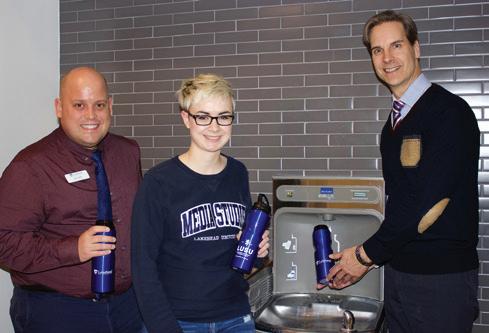
1 minute read
Water
Implement policies and programs to reduce rainwater (i.e. stormwater) runoff and resultant water pollution, and treat water as a resource rather than as a waste product.
STRATEGY ACTIONS
1. Use Low Impact Development (LID) 1.1 Request to be part of the planning practices as a matter of policy or committee for updated Campus Master standard practice to reduce rainwater/ Plan. stormwater runoff volume and improve outgoing water quality for new construction, major renovation, and other projects that increase paved NOTE: Conduct this recommendation in tandem with Grounds recommendations. surface area on campus or otherwise 1.2 Identify areas on both campuses where signifcantly change the campus LID would be highly benefcial. grounds. The policy, plan, and/or strategies cover the entire campus. 2. Adopt a rainwater/stormwater 2.1 Consult with a landscape architect to management policy, plan, and/or help develop an implementation plan. strategies that mitigate the rainwater runoff impacts of ongoing campus operations and treat rainwater as a resource rather than as a waste product. The policy, plan, and/or 2.2 Consult with Academics Working Group and/or community to identify classes and/or students to conduct assessments. strategies address both the quantity 2.3 Gather information during Fall 2017 and quality (or contamination level) (include Academic representation) of rainwater runoff through the use of to see what proposals have been put green infrastructure. Though specifc forward already (e.g. Land Stewardship practices adopted may vary across Proposal Plan, tree inventories, the campus, the policy, plan, and/or Campus Master Plan). strategies cover the entire institution. 2.4 Using the resources as a guide, update the current Master Plan to include data collected in the assessments.
(L-R) Chris Glover, Director of Student Success, Theresa Vandeburgt, LUSU Vice-President Orillia, and Dr. Dean Jobin-Bevans, Principal of Lakehead Orillia, celebrate Lakehead Orillia’s decision to go bottled-water free in January 2019.
Photo credit: Jaclyn Bucik







